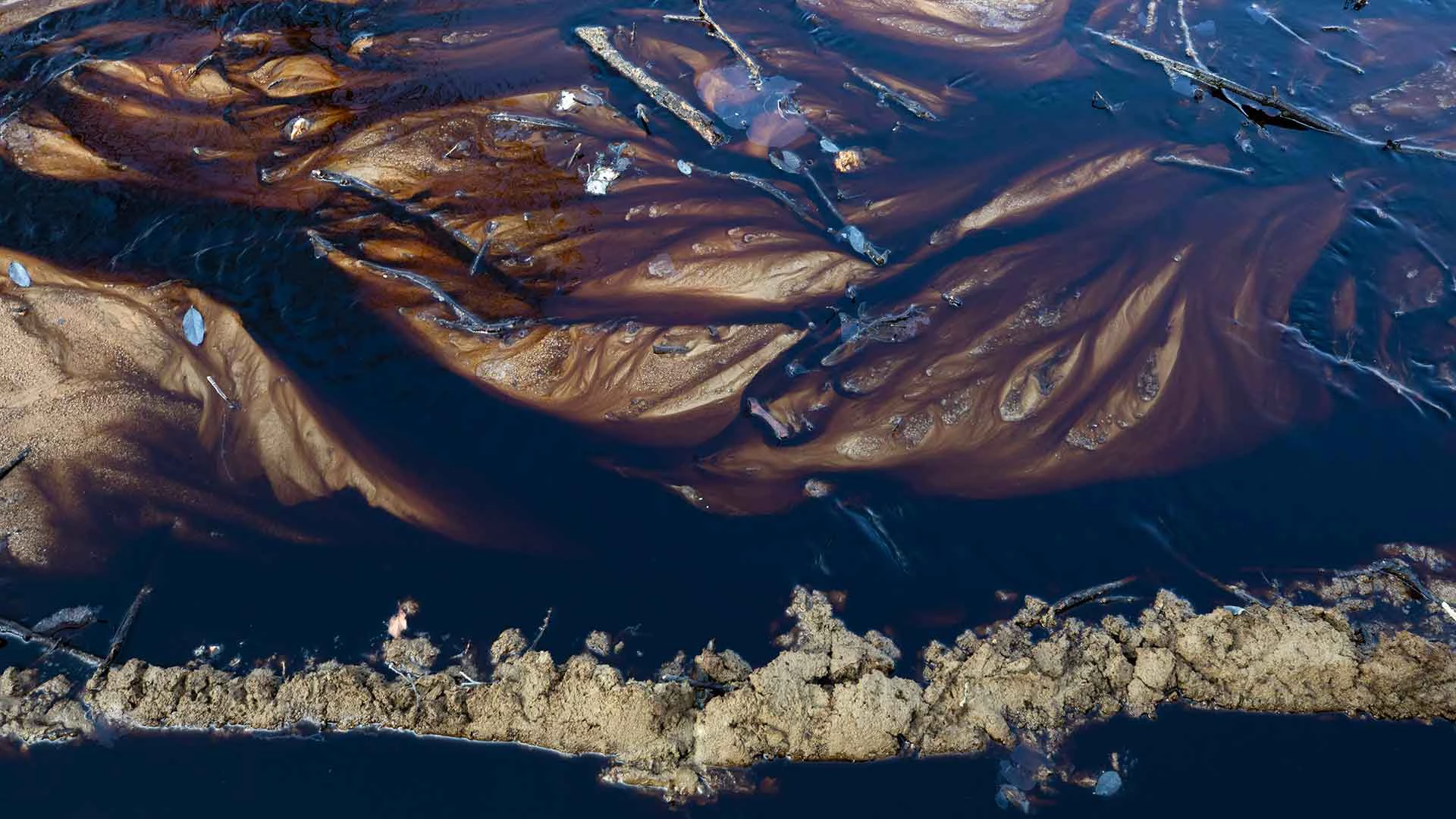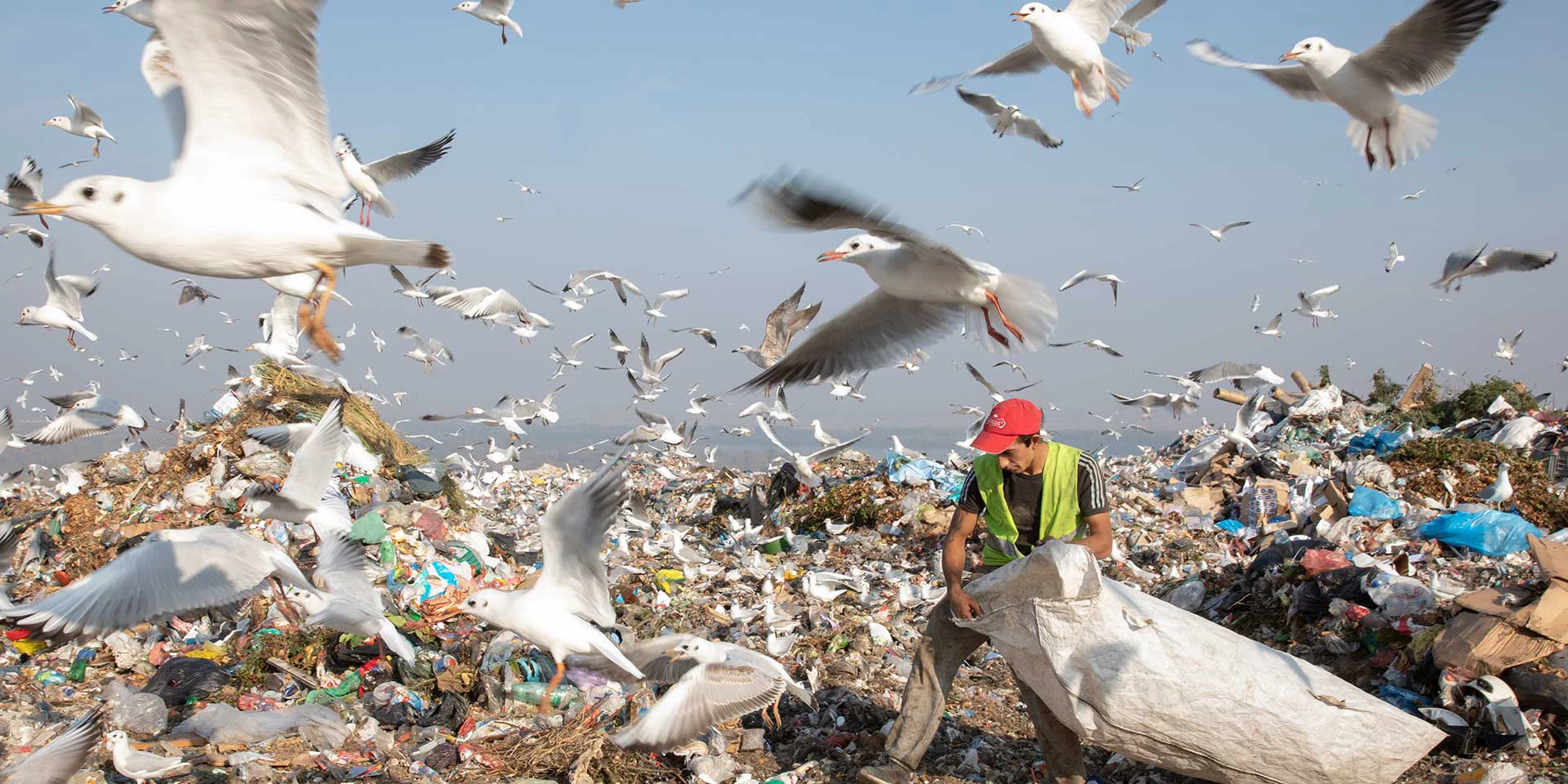BELGRADE, Serbia—Water the color of ash trickles down a hillside, heading for an orchard of plum trees dotting the banks of the Danube.
The tiny waterfalls of black water that empty into Europe’s second-largest river pack a toxic punch: Pollutants are leaching from thousands of layers of trash—some as old as 1977, the year the city started dumping on the site. Environmental experts here say that because the dumpsite has never been properly managed, the water is highly polluted.
The Vinča landfill is the largest unmanaged open dump left in Europe. The landfill absorbs 600 truckloads of trash every day: 1,500 tons of household waste and 3,000 tons of construction waste. Despite taking up as much space as 185 European football fields, the landfill is running out of space to accommodate the new waste delivered daily.
And it is the site of an environmental disaster that is threatening to contaminate the water and air just 15 kilometers from the center of Belgrade. But that is about to change.
In October 2019, a construction crew started building a new sanitary landfill, a waste-to-energy plant and a construction waste recycling unit compliant with applicable European Union specifications and standards. In three years, the existing mountains of trash will become green space, and gas emanating from the trash that has piled up for decades will be collected to generate electricity. Future waste will be processed to generate heat and electricity. Workers also will collect and treat runoff water.
IFC and the Multilateral Investment Guarantee Agency (MIGA)—members of the World Bank Group—are providing €260 million in financing and guarantees to Beo Čista Energija, a special-purpose vehicle formed by global utility company SUEZ, the Japanese conglomerate ITOCHU, and Marguerite Fund II, a pan-European equity fund, to close the existing landfill and build and manage the new landfill and waste facilities.
IFC’s financing package also includes a €20 million blended concessional loan from the Canada-IFC Blended Climate Finance Program, a partnership between the government of Canada and IFC to promote private sector financing for clean energy and climate adaptation projects. The European Bank for Reconstruction and Development (EBRD) and OeEB, the Development Bank of Austria, also provided financing for the project. The advisory effort for the transaction was implemented in partnership with the governments of Austria, Canada, and Switzerland, and the Rockefeller Foundation.
The investment came just in time. There is only one year of space left in the landfill, which has absorbed more than 10 million tons of waste in the last four decades. In some places, the trash towers higher than 70 meters.

“This was the very last moment for Belgrade to open a new landfill,” says Vladimir Milovanović, a Managing Director of Beo Čista Energija.
Experts project that with modern and sustainable approaches to waste management, the new Vinča landfill will last for 30 years.
A Ticking Time Bomb in Emerging Economies
Atop a mountain of trash, a truck backs in and shudders as it unloads the waste: hundreds of plastic bottles, food waste, and broken dolls. Thousands of seagulls dive into the trash, harvesting bits of food and scattering excrement, adding to the squalor of the dump site. A man digs into the trash alongside the birds, plucking any bottles he finds, and tossing them into a plastic sack. The garbage truck lurches forward again, and then again, its tumbler twisting car-sized piles of trash onto the ground. The truck pulls away, spinning with the lingering fumes of fresh garbage added to the mountain of trash.
A tractor takes its place, compressing, and pushing walls of trash toward the Danube River, adding to a landslide of trash that sometimes turns into an avalanche. The extreme stench is accompanied by a daily worry of landslides. A few months ago, the mountainside collapsed under the weight and instability of the trash, leaving a 20-meter-high cliff of garbage, and releasing methane gas.
Another major threat occurs when methane—a potent greenhouse gas that contributes to climate change—escapes from the shifting trash. Smoke curls from a cluster of fires in the northwest corner of the dump site. The gas ignites with exposure to oxygen, setting the landfill ablaze. For days, a pair of workers has been trying to suffocate the fires with piles of dirt.
The smoke, filled with methane and other particles, adds to the smog that has blurred Belgrade’s horizon and blunted its air quality.
“This is just slightly better than hell,” says Dragan Varga, a traffic coordinator who has been working at the landfill for two decades.

Although waste management is a challenge across the world, it is a growing problem in places like Belgrade, as people move to the capital from the countryside. Belgrade is a city on the rise, but its lack of progress on environmental issues is holding it back.
The Vinča landfill, which is more accurately described as a dumpsite where trash is piled but not properly treated, is a big part of this transformation.
“It’s the black spot as far as ecology is concerned, not only for Serbia, but for this part of Europe,” says Siniša Mali, the Minister of Finance for Serbia and the former Mayor of Belgrade.
Already, the city has begun preparing for the new landfill, while trying to protect the people, animals, and flora on the site. Until recently, 17 Roma families were living on the site and working informally as waste-pickers. The city relocated the families and helped them find new apartments and jobs. It also is protecting birds’ habitats, as well as rare plants.
But as the site begins its metamorphosis, daily challenges persist. Each day, the trash inches closer to the Danube. And the river of trash constantly shifts, igniting new site-wide fires that the company fights daily. Roads traversing the site crumble as the trash undulates, making some areas unreachable, except by tractors that perch perilously on steep hillsides of unstable trash.

Proper Waste Management Pays off
Belgrade is not alone. Cities across the globe face similar waste-management challenges.
The World Bank Group estimates that about 2 billion tons of municipal solid waste are produced every year globally—and at least one-third is not managed in an environmentally sustainable manner. This figure is projected to grow to 3.4 billion tons by 2050. Landfills contribute more than 3 percent of greenhouse gas emissions for Europe—and this number is growing.
Cities and countries could learn from what Belgrade and its partners are doing differently.
Five years ago when the city began exploring a solution, “we had no experience in waste and treatment,” says Mali, the current Minister of Finance for Serbia, who was the Mayor of Belgrade from 2014 to 2018, when the project was developed. “It was about trying to find a partner who not only had the financial means to finish the project but also had the know-how and experience to operate it.”
Worldwide, governments provide more than half of waste management services. Waste collection and disposal costs can devour 20 percent of municipal budgets in developing countries, according to the World Bank. Only a third of governments rely on public-private partnerships (PPPs) to solve their waste-management challenges.
IFC and Mali’s mayoral administration discussed the possibilities of the private sector providing an affordable solution through a PPP. During four years of preparation, implemented in partnership with the governments of Austria, Canada, and Switzerland, as well as the Rockefeller Foundation, IFC helped the city develop a sustainable and balanced PPP contract and a transparent and competitive tender process, and improved the untested legal framework for PPPs.
In 2018, the city awarded the PPP contract to the winning bidder, a consortium of SUEZ and ITOCHU, two global leaders in waste management and environmental solutions. A French company, CNIM, is manufacturing the high-technology content equipment, and Energoprojekt, a Serbian construction conglomerate, is handling the construction. MIGA guarantees helped provide assurance to investors that the project would generate repayment and a return on investment, without the need for a sovereign guarantee. The use of an innovative blended concessional finance instrument through the Canada-IFC Blended Climate Finance Program allowed for de-risking of the project, while reaching affordable tariff levels.
The PPP became the first large-scale, bankable, private sector project in waste management in emerging markets, worldwide.
“This PPP project was a good solution to solve infrastructure issues in an efficient way and minimize the impact on the [city’s] budget,” says Mitsuaki Harada, a General Manager at ITOCHU Europe and a Managing Director of Beo Čista Energija.
In addition to managing and treating waste, the project will also convert waste into heat and electricity, which will be sold to offset some of the costs of constructing and operating the new waste processing site, says Thomas Lubeck, Regional Manager for Central and South East Europe at IFC.

“Part of the waste that’s coming in is turned into a resource, rather than a burden,” he says. “The project intervenes at the end of the waste management chain though—the city and its citizens also have a role to play. Recycling rates must be increased in Belgrade, and in Serbia.”
The city has been installing separate collection bins throughout the city in the past few months and is encouraging citizens to recycle more.
“Citizens around the world need to change the way they think about waste, and it is happening now in Belgrade,” he adds.
The Belgrade project is a template for other countries to follow, adds Philippe Thiel, the Country Manager for SUEZ in Serbia and a Managing Director of Beo Čista Energija.
The project, which builds on IFC’s expertise developing inclusive, safe, resilient, and sustainable cities, has the power to guide other cities looking to solve pressing waste management challenges while leveraging the private sector.
“This model can be replicated in other emerging countries, in big cities, having the same kind of dumpsite without any treatment,” Thiel says.
In countries like Serbia, cleaning up their landfills also promises better air quality and uncontaminated rivers, paving the way for healthier, more sustainable, and more hopeful futures for their people.
